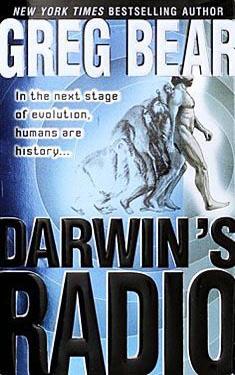Greg Bear
Completed 5/20/2020,
Reviewed 5/20/2020
3 stars
This book
was quite a mixed bag. It’s very hard
science. There’s also a lot of
politics. And it reads like a best
seller science thriller, almost like a cross between Michael Crichton and James
Patterson. I didn’t care for the first
three hundred fifty pages. There were
several times I wanted to put the book down, but I was reading this for my book
club in exile, so I plowed through. Fortunately,
the last hundred fifty pages were much better.
There was less science and more thriller. And I finally began to care about the main
characters. The premise is good: a
pandemic which activates genes causing the next phase of human evolution. I just didn’t think the book lived up to all
the hype I had heard. It was nominated
for a bunch of awards, winning the Nebula in 2000.
Mitch
Rafelson, an archeologist with a bad reputation, discovers three ice mummies in
the Alps. There’s something about them
that makes them seem to be Neandertals.
Back in the states, strange pregnancies are beginning to occur. First, a woman is pregnant, then miscarries,
then is immediately pregnant again, but the baby dies at birth, usually with
severe deformities. Kaye Lang, a
brilliant biologist, starts making a connection between the births and a virus
and genetic mutation. She is asked to
join a Taskforce to study the issue before the phenomenon becomes a
pandemic. In the meantime, Mitch is
developing his own theories, based on research he’s gotten from the University
at Innsbruck in Austria, the group who confiscated the mummies. He has dreams of the lives of his mummies,
which is how he pieces together his theories of what happened to them.
Then, the
pandemic happens, panic ensues, and the government struggles to deal with
it. People grab for power and politics
often wins over science. Amidst all this
chaos, Kaye and Mitch do their best to stay true to their selves and their theories,
eventually working together to come up with an explanation of what’s really
going on.
The plot is
pretty decent, but in those first three hundred fifty pages, I often lost sight
of it because of all the hard biology.
Bear is known as a master of hard science fiction. I would even say that the book satisfies a parochial
definition of the science fiction, i.e. fiction with real science. There’s just so much of it, though. I often found my head swimming trying to
understand it all. I think I would have enjoyed
it more if it was written by someone else, someone who could have softened it
enough for the layperson to follow better.
I also found the politics very hard to
follow. There are a lot of characters
introduced in the political arena, and I found it hard to remember who each
person was and what they were doing. They
added to my trouble keeping the plot straight in my head. Fortunately, the major players in the
politics are a little less than three dimensional, being narcissistic and
power-driven, and it became easier to remember who they were, while the lesser
characters simply settled into a tangled mess in my head known as “other”.
The main
characters, Mitch and Kaye, were both written pretty well. However, I felt even they didn’t get good
development until the last third of the book.
Sure, they were featured often and had extensive back stories, but I
didn’t really begin to care about them until that last third.
The writing
is decent as well. It reminded me a lot
of the bestsellers I was reading in the ‘90s, with almost a journalistic
approach. There’s prose, but it’s very cold. At times, I felt like it wasn’t even
necessary, that the book would have been better off being sparser in its descriptions
of the environment and the people.
I was going
to give this book two stars, but my enjoyment of the last third kicked it up to
three stars out of five. If you like
hard science or are a microbiologist, this book is for you. As a layperson, I found it tough going. However, I have a feeling that when my book
club in exile meets virtually next month, there will be a lot of people who disagree
with me.

No comments:
Post a Comment